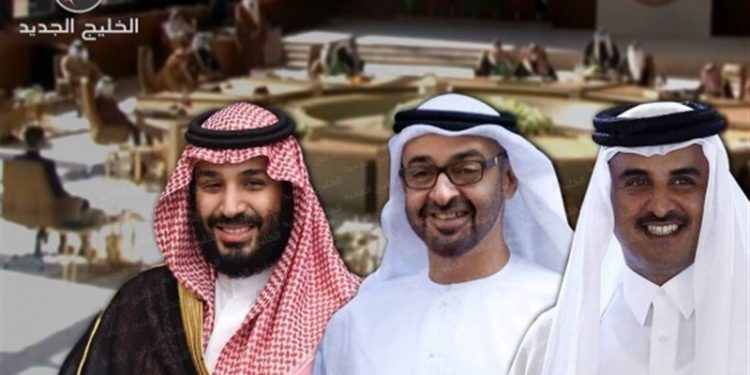According to Al-Khaleej Al-Jadeed, Saudi Arabia has stepped up its efforts to overtake the UAE and Qatar as the Persian Gulf commercial, cultural and geostrategic hub, and has recently sought to challenge its small neighbors to become the most important sports destination in the country. The Middle East is hosting the 2022 World Cup after Qatar was selected.
Saudi Arabia is also seeking a stake in the management of ports and terminals in the region, which have so far been dominated by the UAE and to some extent Qatar.
Saudi Arabia competes with the UAE
Saudi Arabia began its efforts to consolidate its position in the Middle East earlier this year, announcing in February that it would suspend trade with non-headquartered international companies by 2024. . The move could be seen as an attempt to reduce the UAE’s dominance as the GCC’s trading hub. What is increasingly clear is that in the post-oil region, the various plans of the UAE and Saudi Arabia will certainly create more competition between them.
Unlike Saudi Arabia, the UAE ranks 16th in the Ease of Doing Index according to the World Bank 2020 ranking, while Riyadh ranks 62nd.
As a result, Dubai, with its endless commercial space, has long been the headquarters of international companies’ preferred regions, and one UAE-based banker sees Saudi Arabia’s move as a clear challenge to the UAE as well as competing with Dubai.
Saudi Arabia is also weak in terms of port control, with Dubai Ports operating 82 maritime terminals in more than 40 countries, including Djibouti, Somalia, Saudi Arabia, Egypt, Turkey, and Cyprus.
The expansion of Saudi control over the management of ports and terminals does not appear to be fundamentally influenced by geostrategic considerations, but the Saudi Red Sea Gate Terminal Company, backed by the Saudi Public Investment Fund, said it was targeting ports to import vital Saudi imports. Saudi Arabia, like ports, provides food security.
In January, the Saudi Public Investment Fund and China’s Casco Transport Company each bought a 20% stake in the Red Sea terminal company.
The Chinese investment is in line with China’s broader “belt and road” initiative, which includes stocks in ports and terminals in Saudi Arabia, Sudan, Oman, and Djibouti, where China has a military base.
“The company plans to invest in at least three international ports in the next five years,” said Jane Flow, CEO of the Red Sea Terminal, adding that each investment will reach $ 500 million. Our focus is on the ports of Sudan and Egypt, which will become important countries in Saudi Arabia’s food security strategy.
Saudi Arabia competes with Qatar in sports
With a focus on the sports industry, Saudi Arabia has several goals, including a possible bid to host the 2030 World Cup.
Saudi Crown Prince Mohammed bin Salman focuses on the approach of hosting global sports activities for covert purposes, including diverting the minds of unemployed youth in Saudi Arabia.
Saudi Arabia thinks it can polish its image through the sports industry and competition with Qatar, which has been tarnished by human rights abuses, including the assassination of critical Saudi journalist Jamal Khashoggi.
In a report, the Grant Liberty Institute for Human Rights described the Saudi government’s huge spending on sports as a step towards restoring Saudi Arabia’s human rights record.
Therefore, Mohammed bin Salman has signed a $ 145 million contract with the Spanish Football Federation for three years. It has also spent $ 15 million to host an international golf tournament, $ 33 million to host a billiards tournament, and $ 100 million to host a 2019 boxing tournament.
Oil exports will continue to be Saudi revenue
Fahd Nizar, a spokesman for the Saudi Embassy in Washington, said: “Vision 2030 is one of the goals of Muhammad bin Salman to diversify the Saudi economy and end its dependence on oil exports, creating professional sports and the sports industry.”
He added: “Saudi Arabia is proud to host and support various sports competitions, which will make it possible for new sports and international athletes to enter our country.”
The failure of the Saudi Crown Prince in the 2030 project to diversify the Saudi economy as well as reduce oil revenues has led Saudi Arabia to turn to the sports industry. Saudi Arabia’s greater focus on the sports industry shows that Saudi Arabia has backed down from its decision to focus on the energy sector.
Saudi Energy Minister Prince Abdulaziz bin Salman and the Saudi Crown Prince’s brother recently shared the International Energy Agency’s recommendation that “the world should stop investing in oil and gas to reach neutral carbon levels by 2050” as a sequel to the film. Lala read Land and objected to this advice.
The Saudis believe that demand for fossil fuels in Asia will continue to rise, even if it declines in the West, and that other Gulf producers (including the UAE and Qatar) are pursuing a similar strategy. But this does not mean that Saudi Arabia intends to produce less oil, nor does it mean that Saudi Arabia intends to stop financing new oil and gas projects.
Saudi Arabia’s oil revenues, which will be used to finance any green energy program, have fallen in the past year and a half, and the Saudi state-owned Aramco company has been forced to pay bonds to pay heavy cash dividends to its largest shareholder. Publish.
“Sports, entertainment, tourism, and mining, along with other industries envisioned in the 2030 vision, are valuable developments for the Saudi economy that pursue a number of economic and non-economic goals,” said a Saudi analyst.









